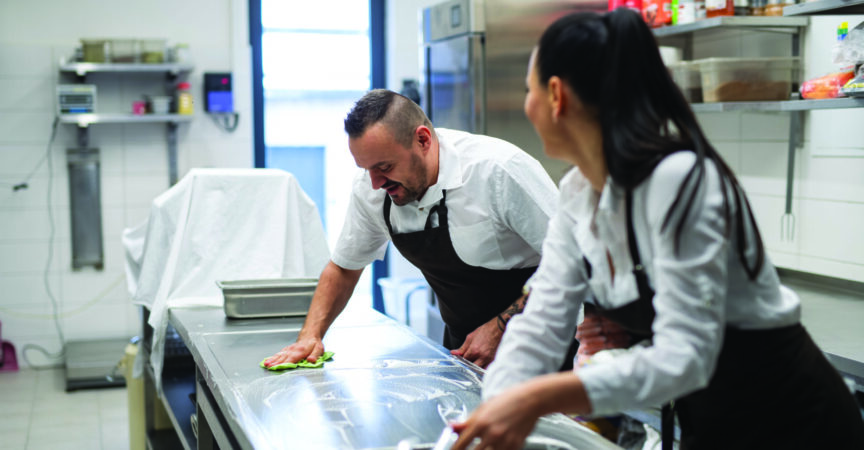Potential Beyond Borders: The transformational effect of newcomers on Canadian foodservice is real, and it’s our future.
Half of all Canadian restaurants are run by entrepreneurs who arrived as immigrants, and 31 per cent of these owners belong to visible minority groups. These restaurateurs are not just business owners; they are community builders who enrich Canada’s cultural mosaic and drive local economies. As the Canadian foodservice industry struggles under the pressure of more than 78,000 job vacancies, Restaurants Canada is recommending a win-win solution with the potential to narrow the gap and offer newcomers real development and growth opportunities, and a path to self-sufficient permanency.
The Canadian government continues to adjust its immigration policies, and the foodservice industry is paying close attention.
Aggressive federal immigration policies designed to infuse the labour market with newcomers have put pressure on housing, healthcare, and infrastructure, leading to measures like intake caps on international student permits. Despite new Canadians’ significant contributions to culture, communities and the economy, public concerns about overpopulation have influenced a more cautious approach.
“The support for immigration in Canada has gone from the highest level of public support for immigration ever in the nation’s history to the lowest level of support, within a year,” acknowledges Richard Alexander, Restaurants Canada Executive Vice President, Government Relations & Public Affairs. “The pendulum has swung dramatically, and that’s being driven primarily by affordability. There’s a perception out there that these open permit, closed permit and temporary foreign workers are contributing to the affordable housing crisis. Many of the provinces, economists and special interest groups have been calling on the government to tighten these permits up as well as the international student program. The federal government is resisting because they understand the importance of those labour streams. The reality is that if it wasn’t for these people and these programs, the country would probably be in a recession right now.”
As the government moves quickly in an attempt to balance the economic benefits of immigration with the capacity to provide adequate public services, Marc Miller, Minister of Immigration, Refugees and Citizenship was interviewed in June on CBC’s Cost of Living with Paul Haavardsrud, where he highlighted a common misapprehension about the immigrant workforce and their contribution to the country: “I think the mental error that we tend to make is to assume that this group of people that are here never become permanent. That’s not true. A good chunk of them actually do, and well they should, particularly when you’re talking about younger segments of the working population, where there are far less people in the workforce per retiree than there were when I was born. It’s a number that should scare all of us. If we want all of the benefits that we’re so proud of in Canada, we need people working and paying taxes.”
We also need a plan.

While Restaurants Canada believes temporary foreign workers are still essential for tourism operators, remote locations or areas without the population base to support local businesses, Alexander points out that the needed labour pool is already here. “There are about a million open permit workers already in Canada—primarily refugees, asylum seekers and international students—who can work anywhere already. A large percentage of them are unemployed or may be working under the table. They represent a stream of labour our industry can employ.”
Restaurants Canada is urging the government to implement a comprehensive program that would match newcomers who are already living in Canada and who have open work permits to employment opportunities in the restaurant industry. These unfilled roles have significantly impacted foodservice operations and service quality, leading to reduced hours, menu limitations, and, in some cases, temporary and permanent closures.
Restaurants Canada’s proposal surfaces a solution within arms-reach with the potential to address both the labour shortages in the restaurant industry and the employment and social inclusion needs of newcomers. And, like most great ideas, the blueprint is simple: address industry labour shortages by connecting newcomers with open employment opportunities and support successful integration into the Canadian economic and social community.
This idea didn’t spring forth from the desert. Canada has previously run several successful, high-retention programs designed to connect newcomers with employment opportunities, notably the Destination Employment Pilot (2019-2021). This pilot program, which matched newcomers with jobs in the hospitality and tourism industry and provided essential training, demonstrated strong results with positive third-party evaluation leading to a recommendation to scale it up. The pilot’s key components included job-specific, on-site language training, which proved to be cost-effective in comparison with classroom-style language training. While the pilot focused on tourism hospitality, expanding it to the broader restaurant industry could enhance its positive impact.
Newcomers to Canada often face significant barriers when entering the job market. These include language challenges, a lack of Canadian work experience, and limited professional networks. A government-run program, supported by the industry, could provide structured support, helping newcomers gain valuable work experience, improve their language skills, and integrate more seamlessly into Canadian society.
This would not only help fill labour gaps but also promote economic and social inclusion, fostering a sense of community and belonging among newcomers. “Our hope is that Canadians will understand the importance and the value of immigration—not just to our industry, but to Canada,” Kelly Higginson, Restaurants Canada President and CEO emphasizes. “Because our industry has been set up as the number one employer of youth, we’re used to teaching people how to enter the workforce,” We generally have a very supportive workplace for newcomers based on our experience with youth.”
The envisioned program would likely feature a range of components, including job matching services, language training, and skills development specifically tailored to the needs of the restaurant industry. Employers would benefit from a reliable source of motivated workers who bring diverse skills and perspectives to their businesses. Meanwhile, newcomers would gain access to stable job opportunities, providing them with financial security and a pathway to further career advancement.
The real-world contribution of newcomers to Canada was brought to life in the Association’s recent video, Table Talk: Menthe and Couscous, which spotlights the Montreal restaurant and personalizes the vital role newcomers play in the foodservice industry and the local economy. The video highlights the story of the Menthe and Couscous owners who have not only brought authentic North African cuisine to the city and become significant community builders, but who are also killing it with their food. As co-owner Riham Reda says: “Google it. You’ll see it’s the best couscous in Montreal!”
To learn more, download Restaurants Canada’s Recruiting International Workers toolkit at: https://www.restaurantscanada.org/toolkit/recruiting-international-workers-toolkit/
Do you have a personal newcomer story to tell?
Restaurants Canada would love to hear it: e: info@restaurantscanada.org

Canada’s first Boston Pizza location was opened in Edmonton, Alberta in 1964 by Gus Agioritis, a Greek immigrant. Since then, the Canadian company has become Canada’s number one casual dining brand and has earned a sterling reputation as a Platinum Member of Canada’s 50 Best Managed Companies and a Great Place to Work.

Callin White
Director of National Development, Boston Pizza
With 25 years in the restaurant industry and five years as head of Boston Pizza’s national franchising team, Cailin White has long seen the success and value of newcomers to the foodservice industry. “A lot of folks come to Canada looking for the Canadian dream and they want to own a restaurant business,” she recalls. “We attract a lot of new Canadians because Boston Pizza is really just such a staple in the Canadian marketplace. We’ve been around since 1964, and we have almost a cult-like following, especially in Western Canada, where we started.”
White believes the Boston Pizza brand and their hiring approach—hire the personality and train the skill—have served them well in finding new talent. “We look for people with leadership and entrepreneurial skills who want to be involved in their community,” she shares. “We have really great stories of folks who came to Canada 15 years ago and started working as a dishwasher in a Boston Pizza, who have worked their way up through the business to become a general manager and are moving into ownership.”
Of all of the challenges confronting the restaurant industry, White believes labour is the greatest. “It’s always been a struggle to find people who are well suited to and want to work in the restaurant industry, and during COVID we saw a lot of talent leave. In tourism and remote and smaller communities, operators really rely on newcomers and temporary foreign worker programs. It works for both parties: the new Canadians seeking employment as a stepping stone to obtaining permanent residency and the business owners because newcomers are often very loyal, goal driven and bring really diverse skill sets, ideas and creativity. I think it’s really a win-win.”
White has also noted a difference in newcomers’ approach to their roles at Boston Pizza, not least of which is a more positive perception of the foodservice industry and the advancement opportunities it offers.
“We meet people who come to us with specific education in hospitality and hotel and restaurant management and that’s their dream and their goal. Those who come to us through the temporary foreign worker program are also very passionate about hospitality and the restaurant world, and oftentimes, they will stay with us for years.”
The full effects of increased restrictions on newcomer talent sources are yet to be seen, but White is certain it will make operating more difficult. “A lot of businesses rely on the program and the newcomer labour force, and it will have a negative impact for sure. We continue to look for different and creative ways to attract employees to Boston Pizza, but newcomer programs have been successful and certainly took the edge off.”

Anil Kapur
Boston Pizza Franchisee
Anil Kapur is a serial franchisee with an unapologetic passion for the Boston Pizza brand. At one time, he owned 16 Boston Pizza restaurants, and these days he remains involved in 10.
Kapur earned his undergraduate degree and Masters in hotel and restaurant management in India, working for Oberoi Hotels. Before he turned 25, he emigrated to Saudi Arabia where he franchised for several U.S. chains, including a burger joint and Chinese, Indian and Italian restaurants. His passion for hospitality led him to become a professional chef and ice carver, which allowed him to travel the world before coming to Canada in 1989, at which point he again immersed himself in the franchise world.
Initially, Kapur worked with several companies including Domino’s Pizza, where he became Operating Partner, and then on to PepsiCo, working with Pizza Hut, Taco Bell, and KFC, where he was decorated number one GM in the world. Having “learned the Canadian way of doing business”, Kapur had his sights set on Boston Pizza. “I knew Boston Pizza was an amazing franchise out West—I knew what they were doing and what they were going to do. So, in 1999, I approached them and became one of the first franchisees to open a Boston Pizza in Ontario, on Queen Street in Brampton. It was a big, huge success because I brought a lot of knowledge and experience from different concepts—it’s an amazing
concept. If you’re passionate about hospitality and you have dreams of enjoying your life and your work, there’s no other concept better than Boston Pizza. It’s a big testament to Boston Pizza that I brought my son into the business. That should tell you how much I love it.”
At the peak of his business, Kapur employed 1,100 people in his restaurants, and an estimated 50-60 per cent were newcomers. “You cannot get into hospitality and be successful without passion. If you’re looking at the clock, this is not the game for you. If you’re just looking for a paycheque, this is not the game for you. Many young Canadians shy away from hospitality. They don’t like the long hours, and working weekends. The industry needs people who really want to be here—who love hospitality, meeting people, and looking after people. The immigrants I hire are more than willing to do it because they come in looking at the long-term picture and see that this will be a good opportunity for them.”
As a business owner and an immigrant himself, Kapur believes immigration is the only way forward to address the labour gap. “Look, my kids are in their early thirties, and they’re not married yet, let alone having kids. So where are you going to get enough people to work? We need quality immigrants, so we need to refresh the program, get the right people with the right skills in who want
to work and make it happen. Without immigrants, we will not be able to cope—our population just doesn’t support the level of productivity we need.”

The first Denny’s opened in Vancouver, British Columbia in 1970. As one of the world’s most iconic and beloved full-service family restaurants, Denny’s has a well-known reputation for its efficient level of service and great guest experience. With many locations open 24/7, Denny’s relies on new Canadians to help provide essential new growth opportunities, not only for the brand but also within its organizational structure.

Rakesh Nanda
Director of Operations, Denny’s
“For them, it’s a life-changing opportunity,” Nanda says. “For us, it’s a nightmare without them.”
As Director of Operations, Rakesh Nanda is responsible for over 30 Denny’s locations across the Canadian prairies. He begins by acknowledging the importance of newcomers, who not only hold vital positions but also come with several years of experience and a well-respected qualification in culinary or the hospitality industry. “The level of accountability and the operations have improved drastically,” Nanda asserts. “Before it was taking 30 minutes for the food to be served – now it’s coming out in 10. Our guests are happier, which is positively reflected in our sales and costs, resulting in each restaurant working more efficiently. This in turn motivates team members to stay with us for longer, forging and developing a long-term career within the industry.”
But like Boston Pizza, Denny’s is expecting to be negatively impacted by the increased restrictions on newcomer talent sources. Nanda has already identified a significant and unexplained slowdown in the processing time for Labour Market Impact Assessment (LMIA) approvals. “The TFW program has been a great help in keeping our restaurants operating, until recently. Up to December 2023, LMIAs had shorter processing timelines. While we are consistently adjusting and updating our practices to accurately adhere to the application process, I still have 45 applications waiting over six months for approval” he advises. “There is no explanation—we’re just told they’re in the queue. Important and valued team members are just sitting at home, not allowed to work, and we have no idea when their LMIAs will be processed.”
With no resolution forthcoming from the government and roughly 200 people working with Denny’s in danger of being affected by changes in procedure, the number of employees without income is likely to grow in the not-too-distant future. This Kafkaesque situation adds layers of frustration to an already urgent situation for restaurants. “We are supporting them as much as we possibly can. We run restaurants, so the least we can do is feed them and reassure them. But now they’re at home suffering, with the restaurants suffering too, and we don’t know what to do.”
“We have so many success stories from team members who started with us through the TFW program and are now with Denny’s for over 15, 20 years or even longer. They have moved into senior management levels within the organization, utilizing their unique perspective to influence and enact positive brand changes along the way.” Nanda shares. “I also know of team members who originally only planned to stay for a limited time to gain better industry experience. However, having witnessed the vast career opportunities available, they decided to settle and raise their families in their new hometowns. They work hard to contribute to a better future, not only for themselves but for everyone within their local communities, becoming an integral, beloved, and reliable part of their small town neighborhoods and cities in Alberta, Saskatchewan, or Manitoba.”









